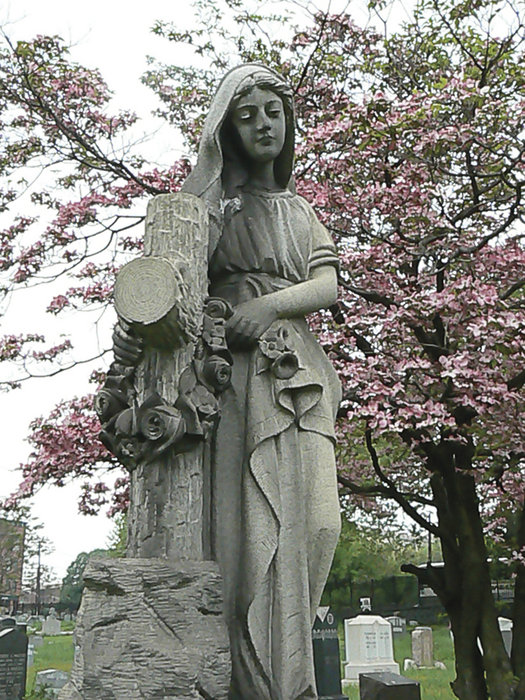The lights at the Historic Jersey City and Harsimus Cemetery are back on, but the landmark graveyard is still facing tough financial troubles that threaten its long-term survival.
Earlier this month Eileen Markenstein, president of the cemetery’s board, sent out an S.O.S. e-mail to community members and past supporters asking for donations so the cemetery could pay an overdue $1,000 bill from PSE&G after the utility company shut off the electricity. The power shut off affected lighting throughout the cemetery grounds, including the electricity at the gatekeepers’ house where two U.S. military vets live full-time. The veterans serve as full-time volunteer caretakers at the facility in exchange for free housing at the gatekeepers’ house.
Days after Markenstein circulated her e-mail a supporter stepped forward with a donation that covered the debt and got the lights turned back on. A grateful Markenstein said she is thankful for the donation, but acknowledged last week that the historic site continues to face many economic challenges.
Markenstein estimated the cemetery needs about $3,000 a month to meet its operating expenses.
____________
Final resting place of many vets
Created in 1829, the Harsimus Cemetery holds historical significance largely because it was the first nondenominational cemetery in the state of New Jersey. Prior to its creation, cemeteries throughout the state were affiliated with churches and synagogues, and one had to be a member of a specific religious institution to be buried in those graveyards. Beginning in the 1800s, however, entrepreneurs increasingly opened private cemeteries that were not affiliated with religious institutions, selling grave plots for a profit. Unfortunately this business model led to an unforeseen consequence. When these cemeteries ran out of land to sell they lacked the financial resources needed for upkeep, and they were typically abandoned.
“We have no revenue coming in from either the sale of new plots or from people whose family members are buried here,” Markenstein said.
Some nondenominational cemeteries in Hudson County have been completely lost, like Jersey City’s Speer Cemetery and Snake Hill Cemetery in Secaucus, which was literally plowed over to make way for the New Jersey Turnpike.
“This is a problem that most non-religious cemeteries in the state may face,” Bob Murgittroyd, former president of the Hudson County Historical Society, told the Reporter in 2009. “On one end of the spectrum you have the old Snake Hill Cemetery in Secaucus that’s now exit 15X on the New Jersey Turnpike. It’s gone. It’s lost for all time. Speer has been abandoned now for almost 100 years. There’s nobody to take care of it and it’s in terrible shape. [Harsimus Cemetery] was recently facing the same problems that Speer has.”
Once a lovely manicured space, Speer Cemetery is now overgrown with grass and weeds and is littered with trash.
In 2008, the last of Harsimus Cemetery’s longtime board members died and it, too, was abandoned until a group of volunteers, including Markenstein, stepped in to clean and take care of it. These volunteers now keep the grass trimmed and the cemetery free of garbage with the help of the two military vets who live on the premises.
Known as one of the oldest garden-style, landscaped cemeteries in a nation, the Historic Jersey City and Harsimus Cemetery is also the final resting place for many veterans of the Revolutionary War, the War of 1812, and the U.S. Civil War.
‘We can’t touch a dollar’
But over the last year Markenstein said the number of active volunteers has declined noticeably and monetary donations also declined during the recession.
“We lost a little momentum,” Markenstein conceded. “We survive mainly on fundraising events so we can make repairs, pay the bills, and continue operating.”
Insurance bills, fuel costs, and equipment upkeep are the cemetery’s biggest operating expenses, Markenstein said. She estimated the cemetery needs about $3,000 a month to meet its operating expenses. “That’s not a lot of money when you think about it. But when there’s no income, it’s tough in this economy for people to make donations.”
Markenstein said that with the help of volunteers the cemetery has applied for and received grants. For example, the cemetery has been awarded a $50,000 grant from the Hudson County Open Space Trust Fund. That grant is, however, a matching grant.
“We can’t touch a dollar of that grant money until we raise a matching amount,” Markenstein explained.
In addition to money, the Historic Jersey City and Harsimus Cemetery needs more help from volunteers.
“Even though we have the two veterans helping us, we still need volunteers to help with fundraising, grant writing, and ground maintenance,” Markenstein said. The cemetery board would also like to reset the stone walkways throughout the graveyard grounds.
Typically volunteers show up each Saturday afternoon to help trim grass, cut weeds, and reset grave stones that nature is threatening to overtake. At present, about four volunteers typically show up each Saturday. Markenstein said she’d like to see as many as 15 to 20 each week. And the cemetery board, she said, is open to accommodating the schedules of volunteers who can’t visit the cemetery on Saturdays.
To learn more about the Historic Jersey City and Harsimus Cemetery and volunteer opportunities, visit www.JerseyCityCemetery.org or contact Eileen Markenstein at (201) 707-0738.
E-mail E. Assata Wright at awright@hudsonreporter.com.
